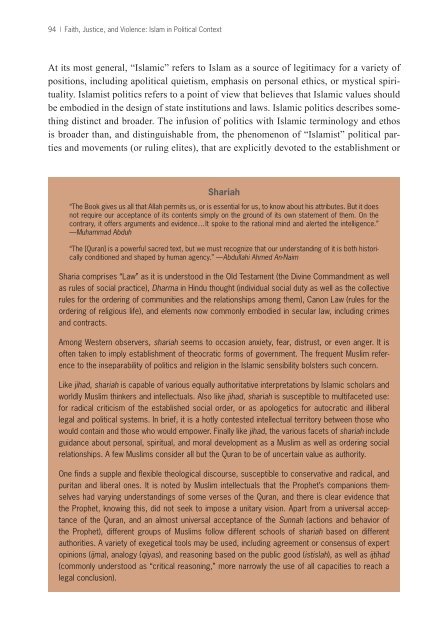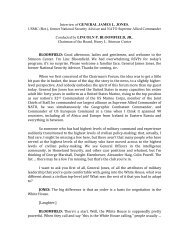Islam and Politics - The Stimson Center
Islam and Politics - The Stimson Center
Islam and Politics - The Stimson Center
You also want an ePaper? Increase the reach of your titles
YUMPU automatically turns print PDFs into web optimized ePapers that Google loves.
94 | Faith, Justice, <strong>and</strong> Violence: <strong>Islam</strong> in Political Context<br />
At its most general, “<strong>Islam</strong>ic” refers to <strong>Islam</strong> as a source of legitimacy for a variety of<br />
positions, including apolitical quietism, emphasis on personal ethics, or mystical spirituality.<br />
<strong>Islam</strong>ist politics refers to a point of view that believes that <strong>Islam</strong>ic values should<br />
be embodied in the design of state institutions <strong>and</strong> laws. <strong>Islam</strong>ic politics describes something<br />
distinct <strong>and</strong> broader. <strong>The</strong> infusion of politics with <strong>Islam</strong>ic terminology <strong>and</strong> ethos<br />
is broader than, <strong>and</strong> distinguishable from, the phenomenon of “<strong>Islam</strong>ist” political parties<br />
<strong>and</strong> movements (or ruling elites), that are explicitly devoted to the establishment or<br />
Shariah<br />
“<strong>The</strong> Book gives us all that Allah permits us, or is essential for us, to know about his attributes. But it does<br />
not require our acceptance of its contents simply on the ground of its own statement of them. On the<br />
contrary, it offers arguments <strong>and</strong> evidence … It spoke to the rational mind <strong>and</strong> alerted the intelligence.”<br />
—Muhammad Abduh<br />
“<strong>The</strong> [Quran] is a powerful sacred text, but we must recognize that our underst<strong>and</strong>ing of it is both historically<br />
conditioned <strong>and</strong> shaped by human agency.” —Abdullahi Ahmed An-Naim<br />
Sharia comprises “Law” as it is understood in the Old Testament (the Divine Comm<strong>and</strong>ment as well<br />
as rules of social practice), Dharma in Hindu thought (individual social duty as well as the collective<br />
rules for the ordering of communities <strong>and</strong> the relationships among them), Canon Law (rules for the<br />
ordering of religious life), <strong>and</strong> elements now commonly embodied in secular law, including crimes<br />
<strong>and</strong> contracts.<br />
Among Western observers, shariah seems to occasion anxiety, fear, distrust, or even anger. It is<br />
often taken to imply establishment of theocratic forms of government. <strong>The</strong> frequent Muslim reference<br />
to the inseparability of politics <strong>and</strong> religion in the <strong>Islam</strong>ic sensibility bolsters such concern.<br />
Like jihad, shariah is capable of various equally authoritative interpretations by <strong>Islam</strong>ic scholars <strong>and</strong><br />
worldly Muslim thinkers <strong>and</strong> intellectuals. Also like jihad, shariah is susceptible to multifaceted use:<br />
for radical criticism of the established social order, or as apologetics for autocratic <strong>and</strong> illiberal<br />
legal <strong>and</strong> political systems. In brief, it is a hotly contested intellectual territory between those who<br />
would contain <strong>and</strong> those who would empower. Finally like jihad, the various facets of shariah include<br />
guidance about personal, spiritual, <strong>and</strong> moral development as a Muslim as well as ordering social<br />
relationships. A few Muslims consider all but the Quran to be of uncertain value as authority.<br />
One finds a supple <strong>and</strong> flexible theological discourse, susceptible to conservative <strong>and</strong> radical, <strong>and</strong><br />
puritan <strong>and</strong> liberal ones. It is noted by Muslim intellectuals that the Prophet’s companions themselves<br />
had varying underst<strong>and</strong>ings of some verses of the Quran, <strong>and</strong> there is clear evidence that<br />
the Prophet, knowing this, did not seek to impose a unitary vision. Apart from a universal acceptance<br />
of the Quran, <strong>and</strong> an almost universal acceptance of the Sunnah (actions <strong>and</strong> behavior of<br />
the Prophet), different groups of Muslims follow different schools of shariah based on different<br />
authorities. A variety of exegetical tools may be used, including agreement or consensus of expert<br />
opinions (ijma), analogy (qiyas), <strong>and</strong> reasoning based on the public good (istislah), as well as ijtihad<br />
(commonly understood as “critical reasoning,” more narrowly the use of all capacities to reach a<br />
legal conclusion).

















